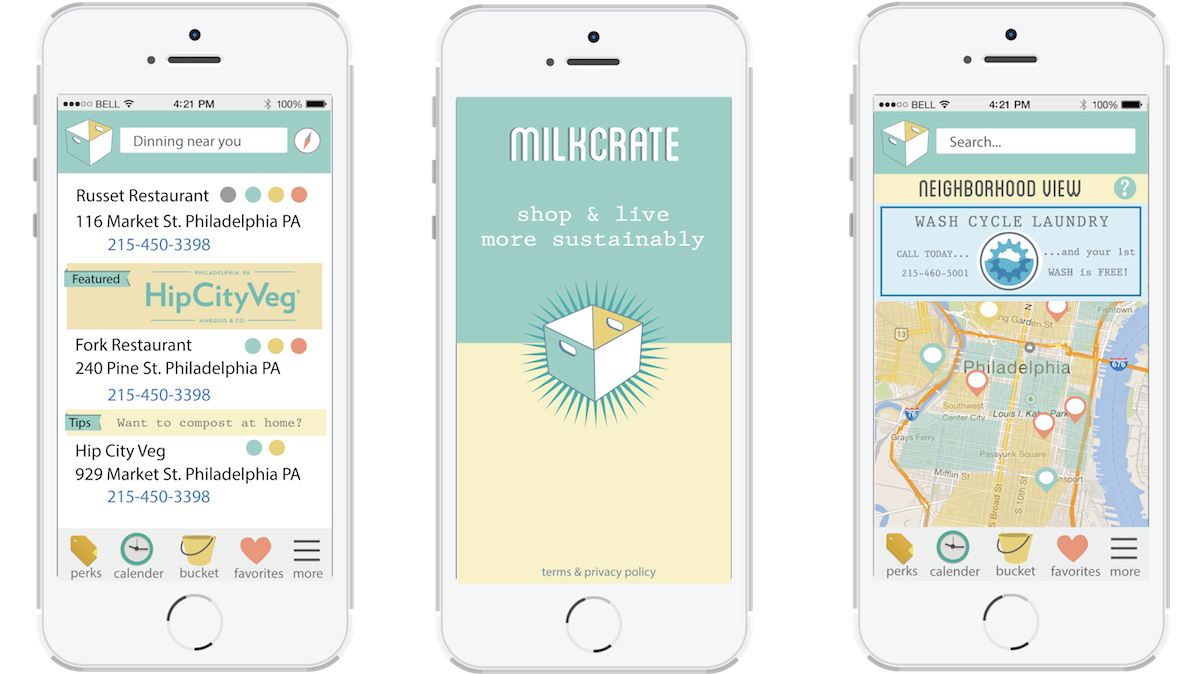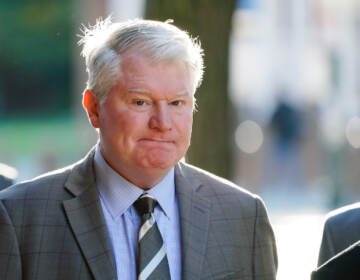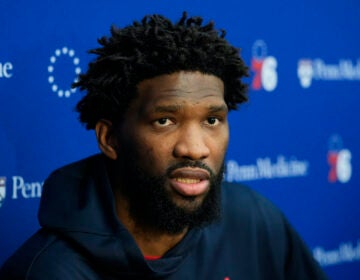Philadelphia U. grad creates sustainable living app

A look at how Milkcrate works. (Courtesy of Morgan Berman)
A few years ago, Philadelphia University graduate Morgan Berman was, truth be told, sorely testing her friends’ patience by composting with worms in her own kitchen.
“My roommates were not particularly fond of this system,” she admits. But in November, the CEO and co-founder of MilkCrate, a Philly-based tech start-up, was formally recognized by the United Nations Foundation on its global “Top 10 Women to Watch” list for an app that helps users make eco-friendly choices in everyday life.
“It doesn’t feel real, and it probably won’t for awhile,” Berman says, chatting with NewsWorks on MilkCrate’s first day in its new offices at the Inquirer/Daily News building on Market Street, thanks to Project Liberty, a Philly-area incubator for new media and tech companies.
Finding the words
As a child, Berman lived with her family in Elkins Park and then Chestnut Hill before relocating to Wyncote. She got her degree in women’s studies and anthropology at The College of William and Mary in Virginia, and went to work for Planned Parenthood after graduation.
As a youngster, she didn’t always have the term “sustainability” echoing in her mind, but those values were “infused” in her house from an early age. She said discovering the ability to major in women’s studies, and later, go to graduate school for sustainable design at Philadelphia University in East Falls, were similar moments.
“It just clicked,” she says.
Women’s health, world health
Given her history of advocacy for women’s health, Berman sees a clear connection between reproductive care and sustainable living.
“On a human sustainability scale, a woman’s choice to control her reproductive health and life is so essential to her own abilities to have the kind of work, education and quality of life that she wants,” she says.
Berman completed her Master’s last May, but she laid the groundwork for MilkCrate while she was still a grad student, using her Master’s thesis to develop it. In addition to the program at Philadelphia University, working with Grid magazine also helped to jumpstart her business concept.
The magazine featured a range of organizations and businesses collaborating with members and customers for healthy and eco-friendly lifestyle choices, but Berman thought the digital world could offer more. The choices in a magazine weren’t “searchable in any mobile lifestyle-friendly tool.”
Facing her thesis was the catalyst: “the bringing it all together idea: ok, I will just make that tool. That’ll be easy, right?”
Not quite — but the momentum has been building quickly in the last few months.
Bootstraps to beta
“We basically bootstrapped the company from the first year on pretty much nothing,” she said of a cobbling together of gifts, swaps, and barters for the skills and tools they needed.
Then, about two months ago, MilkCrate finished a successful crowd-funding campaign via Indiegogo, raising 103 percent of its total goal in sixty days: $20,695. Fundraising efforts for more seed money continues.
“It was a long slog,” she says of first approaching the larger organizations she hoped would partner with MilkCrate, like Fair Food and the Sustainable Business Network of Greater Philadelphia.
“Once we were able to get them onboard, it was easier to reach out to the businesses…A lot of energy was spent getting that first yes, and then it became a lot easier from there.”
The beta version of MilkCrate launched about three months ago, and it features over 2,000 listings in the Philadelphia area, including Weavers Way Co-Op, that users can filter with 20 different lifestyle categories, including food, fashion, energy, transportation, and education.
For now, the company is looking to Jan. 2015 for the launch of the official app, but early users who want to test the platform can download the beta version on the MilkCrate website. As the official version gets rolling, Berman is excited to incorporate another filtering badge: local farmers markets that accept SNAP benefits, because she sees affordability as a key part of access to sustainable living.
And the company is already expanding into other cities: a MilkCrate teammate is currently launching a Denver outpost, and January will bring a new partnership with a Georgetown University student who will head a Washington, DC location.
So why is the app called MilkCrate?
Berman said she’s seen lots of people around the city with old milkcrates strapped to their bikes, to carry their things as they ride. To her, it’s the perfect symbol of creative repurposing for modern eco-conscious city-dwellers.
“MilkCrate is the place to spread the information and provide the help to live that sustainable life.”
WHYY is your source for fact-based, in-depth journalism and information. As a nonprofit organization, we rely on financial support from readers like you. Please give today.




